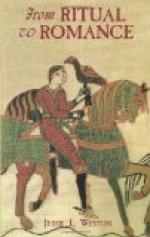The original form, Bledri, was by no means uncommon in Wales: from that point of view there might well have been four or five, or even more, of that name, but that each and all of these should have possessed the same qualifications, should have been equally well versed in popular traditions, equally dowered with the gift of story-telling, on equally friendly terms with the Norman invaders, and equally possessed of such a knowledge of the French language as should permit them to tell their stories in that tongue, is, I submit, highly improbable. This latter point, i.e., the knowledge of French, seems to me to be of crucial importance. Given the relations between conqueror and conquered, and the intransigeant character of Welsh patriotism, the men who were on sufficiently friendly terms with the invaders to be willing to relate the national legends, with an assurance of finding a sympathetic hearing, must have been few and far between. I do not think the importance of this point has been sufficiently grasped by critics.
The problem then is to find a Welshman who, living at the end of the eleventh and commencement of the twelfth centuries, was well versed in the legendary lore of Britain; was of sufficiently good social status to be well received at court; possessed a good knowledge of the French tongue; and can be shown to have been on friendly terms with the Norman nobles.
Mr Edward Owen, of the Cymmrodorion Society, has suggested that a certain Welsh noble, Bledri ap Cadivor, fulfils, in a large measure, the conditions required. Some years ago I published in the Revue Celtique a letter in which Mr Owen summarized the evidence at his disposal. As the review in question may not be easily accessible to some of my readers I will recapitulate the principal points.[11]
The father of Bledri, Cadivor, was a great personage in West Wales, and is looked upon as the ancestor of the most important families in the ancient Dyfed, a division now represented by Pembrokeshire, and the Western portion of Carmarthen. (We may note here that the traditional tomb of Gawain is at Ross in Pembrokeshire, and that there is reason to believe that the Perceval story, in its earliest form, was connected with that locality.)
Cadivor had three sons, of whom Bledri was the eldest; thus, at his father’s death, he would be head of this ancient and distinguished family. At the division of the paternal estates Bledri inherited, as his share, lands ranging along the right bank of the lower Towey, and the coast of South Pembrokeshire, extending as far as Manorbeer, the birthplace of Giraldus Cambrensis. (This is again a geographical indication which should be borne in mind.) Cadivor himself appears to have been on friendly terms with the Normans; he is said to have entertained William the Conqueror on his visit to St David’s in 1080, while every reference we have to Bledri shows him in close connection with the invaders.




